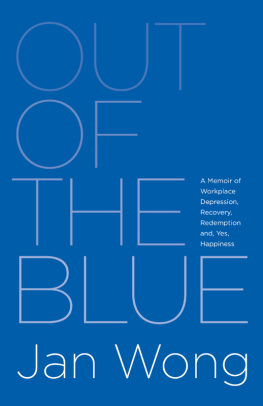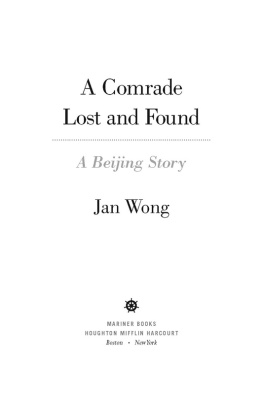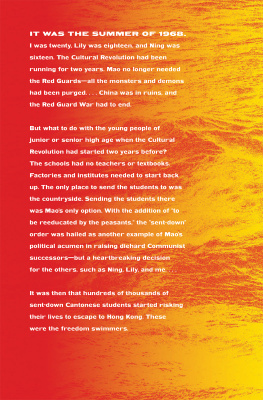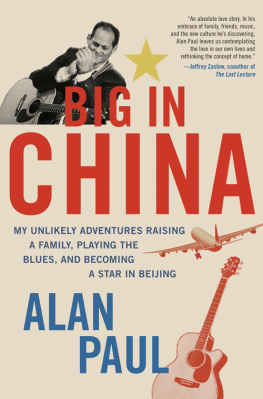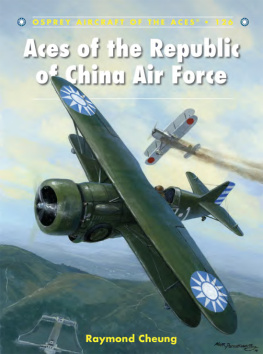First published in paperback in Australia and New Zealand in 1997 by Anchor
Hardback edition 1996 by Doubleday
First published in Canada in 1996 by Doubleday Canada Limited
Copyright 1996 Jan Wong
Paperback first published in 1997
Paperback reissued in 2007
All rights reserved. No part of this publication may be reproduced, stored in a retrieval system, transmitted in any form or by any means, electronic, mechanical, photocopying, recording or otherwise, without the prior written permission of the publisher.
Anchor Canada and colophon are trademarks.
Library and Archives Canada Cataloguing in Publication has been applied for.
eISBN: 978-0-385-67436-2
Published in Canada by
Anchor Canada, a division of
Random House of Canada Limited
Visit Random House of Canada Limiteds website: www.randomhouse.ca
v3.1
CONTENTS
To my parents
and
Fat Paycheck Shulman
Acknowledgments
John Pearce, editor-in-chief of Doubleday Canada, first approached me with the idea of writing a book, and stayed enthusiastic for five more years while I finished my posting in Beijing. He read several very rough drafts, and with great tact and grace, helped steer me in the right direction. Charles Conrad, editor-in-chief of Anchor Books, New York, made invaluable suggestions and kept me true to the spirit of the book. Shaun Oakey did a masterful job of copy-editing the manuscript. Michael Cohn, my agent, was always there when I needed him.
I thank Norman Webster, former editor-in-chief of the Globe and Mail (and former Beijing correspondent), and Geoff Stevens, former managing editor, for sending me to Beijing. I also thank William Thorsell, my subsequent editor-in-chief, for keeping me there, and John Cruickshank, my subsequent managing editor, who saw to it that I got a years book leave upon my return. I thank the Canada Council for providing a timely grant.
In Beijing, my fellow journalists Catherine Sampson and Lena Sun gave me their indispensable friendship, valued insights and professional expertise. Later, Cathy read several early drafts and made numerous helpful suggestions and corrections from Ann Arbor, Michigan, and Hong Kong. Lena read later drafts in Washington, D.C., helped me with queries and saved me from myself many, many times. Thanks also to my matchmakers, Zheng Peidi (Betty) and Xu Shimin (Saiman Hui), who helped me render the title into Chinese. They also read a draft and corrected several errors. Any remaining mistakes, of course, are my own.
Many friends taught me so much about China. They include the old revolutionaries who went to work there: Pat Adler and her late husband, Sol, Betty Chandler, Ruth Coe and her late husband, Frank, Isabel and David Crook and their remarkable sons, Carl, Michael and Paul, Israel Epstein and his late wife, Elsie Fairfax-Cholmeley, Kathy Chi and Bill Hinton, Joan Hinton and Sid Engst and their children, Fred, Billy and Karen, lone Kramer, Sidney and Yulin Rittenberg, the late Julian Schuman, Sidney Shapiro, Bertha Sneck, Jane Su, Ruth Weiss, and Gladys and Yang Xianyi and their daughter and my classmate, Yang Zhi.
They also include former classmates and friends, now diplomats, aid workers, businesspeople and sinologists: Patricia Alexander, Anu Arponen, Timothy Brook, Neil Burton, Anders Hansson, Peter and Chris Gilmartin, Pat and Roger Howard, Ellen Judd, Frank and Dorothy Kehl, Britta Kinnemark, Nick Menzies, Sandra Sacks and Ola Svensson.
My fellow Overseas Chinese, with whom I could discuss anything, include Norman Bock, Maria Fang, David Hsieh, George Leung, Ben Mok, Bing and Bonnie Thorn and Wenlan Peng. I also thank the MSG Club members, the Macho Sino Girls of our elitist, racist, sexist club in Beijing, whose founders included journalists Charlene Fu, Lena Sun, Mary Wong and Sheryl WuDunn.
Diplomats and other professionals working in China who gave me friendship and generously shared their knowledge include: Mary Ann Burris, Daniel Dhavernas, Earl and Monica Gruder Drake, John Hecht and Laura Sabin, Normand Mailhot, Don Myatt, Michel Riberdy, Judith Standley and Tse Hau-sing.
I especially thank these journalists and colleagues in China and Hong Kong: Jim Abrams, Zorana Bakovic, Daniel Biers, Diana Bishop, Louise Branson, Michael Browning, Sandra Burton, Mike Chinoy, Robert Delfs, Seth Faison, Jaime FlorCuz, Edward Gargan, Caroline Gracie, David and Fumio Holley, Susan Lawrence, LeeYee, Julia Leung, Simon Long, Timothy Luard, Robert MacPherson, Jim and Cathy McGregor, James Miles, Jim Munson, Judy Polumbaum, Caroline Straathof, Mia Turner and Kathy Wilhelm.
Among the Chinese friends who have left China and can be thanked are Chi Ching, my indispensable news assistant Yan Yan and her successor, Stella Wu. There are many, many others to thank who cannot be named. They include several classmates, a filmmaker, a novelist, two journalists, a laid-off factory worker, an office worker, several dissidents, student activists and a seamstress.
Professors Ella Laffey and Paul Lin of McGill University gave me an appreciation of the complexities of Chinas history. Many more people have guided and influenced my career as a journalist. I especially thank: The New York Timess Fox Butterfield and James Sterba, who showed me how much fun being a foreign correspondent could be; Professor Melvin Mencher of Columbias Graduate School of Journalism for teaching me the nuts and bolts of reporting and how, above all, to keep that fire in the belly; Joseph Gelmon, my copy chief at the Montreal Gazette, who fed me dinner while I watched Lou Grant, and valued colleagues Jay Bryan, Janet Brooks, Jennifer Hunter, David Pinto and Shirley Won; my editors and colleagues at the Boston Globe, Gordon McKibben, Lincoln Millstein, Steve Bailey, Jane Meredith Adams, Kathryn Tolbert and Jonathan Kaufman; and my bureau chief and colleagues at the Wall Street Journal, June Kronholz, David Wessel and David Stipp.
I owe a great debt to my editors and colleagues at the Globe and Mail. Timothy Pritchard hired me as a business reporter and didnt mind when I ran off to Beijing soon after. Sue Andrew of the foreign desk always kept the money flowing, even when I was five months behind in my expense accounts during Tiananmen Square. Ann Rauhala, my foreign editor, was unfailingly encouraging, as were her two deputies, Jane Gadd and Larry Orenstein. Colleagues Alexandra Eadie, Stephen Strauss and Elinor Reading always kept the in-house gossip flowing so I would not feel completely isolated in Beijing. Amanda Valpy, the chief librarian, and her colleagues helped me retrieve photos I had taken in China for the Globe and obtained permission for me to use them in this book.
In Toronto, my Aunt Ming and Uncle Ying, now both in their eighties, and my cousin Colleen Parrish Yao, helped me trace the family history. My Uncle Yao provided the Chinese calligraphy for the jacket. My sister, Gigi, provided computer advice no matter what time of the day or night and helped me recall some of the funnier incidents in China. My parents, Bill and Eva Wong, instilled in me an abiding curiosity about the country of my ancestors and put up with my Maoist phase unfazed.
In Beijing, my Chinese staff did everything so I could concentrate on journalism. In Toronto, Mercedita Iboro took over the housework, the cookie baking and the care of my sons, making it possible for me to write this book. Ben, then four, learned that a chair placed in front of the entrance to the living room, which led to my sunroom office, meant No Entry, and soon taught his brother, Sam, then one, the same. My husband, Norman, has been unfailingly supportive and loving, giving up his career to follow me back to Beijing, changing the majority of the diapers for our sons and correcting my drafts while taking the subway to his new job in Toronto.


